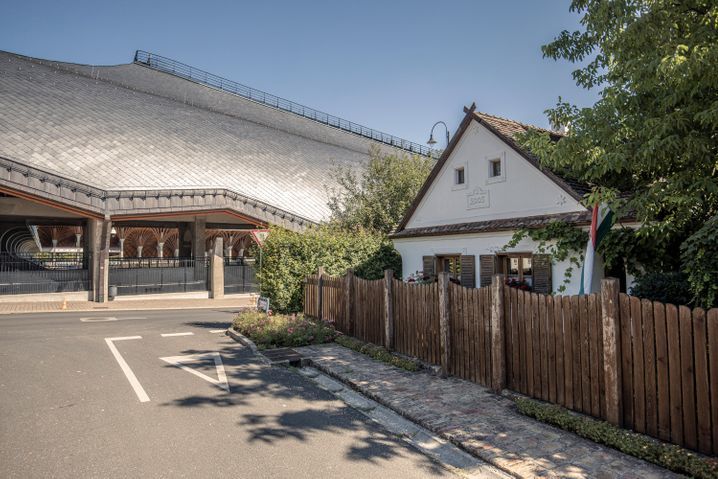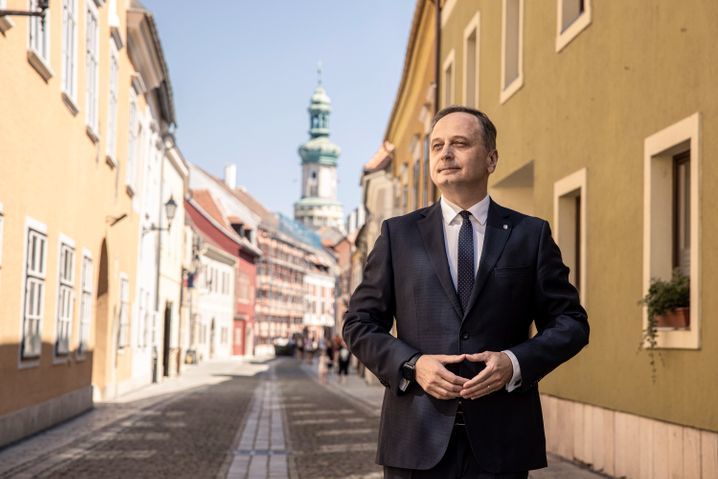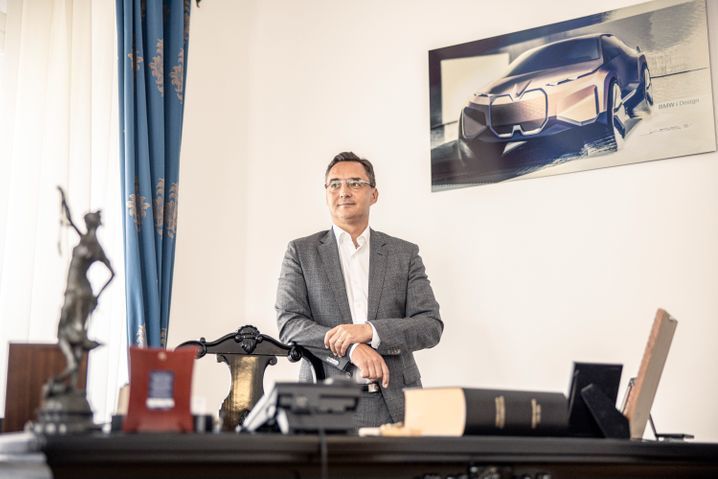
The One-Man State: Viktor Orbán and the Fall of Democracy in Hungary
The border between Austria and Hungary runs through the plains not far from Lake Neusiedl, a line dividing West and East and – at least according to Viktor Orbán – uprooted liberals and steadfast patriots. Only in his country, he claims, are people still safe from rampant immigration and de-Christianization.
In 1989, here on the border dividing Sopron from the Austrian state of Burgenland, people streamed westward through a gap in the Iron Curtain. The iconic images of fleeing East German citizens were long viewed as evidence of the apparent triumph of the Western system of values.
It was the moment that Orbán himself stepped out of the twilight of declining socialism and into the light of history. He first became know to a broader public on June 16, 1989, in Budapest, a 26-year-old with scruffy beard and long hair who was a fiery orator. Orbán climbed the tribune at the ceremony marking the reburial of the body of Imre Nagy, the prime minister executed by the regime in 1958. There, in front of hundreds of thousands, he demanded the withdrawal of the still heavily armed Soviet troops from Hungary. The performance brought him popularity.
Today, three decades later, the lanky provocateur of yesteryear is hardly recognizable, and not just on the outside. As a long-time prime minister and the eloquent leader of the ruling Fidesz party, Orbán is challenging the legal and moral norms of the European Union. After the fall of communism in 1989, he said that Hungarians and other Europeans believed "that Europe is our future." But that is no longer the case. "Now, we feel that we are the future of Europe." Anyone looking for a symbol of the failure of Western elites, he says, need only look to Brussels: to the European Commission.
Patience with Orbán within the European Commission, the EU’s executive, and within the European Parliament appears to be running out. Commission President Ursula von der Leyen is holding back the disbursement to Budapest of the first tranche of a total of 7.2 billion euros from the EU’s coronavirus reconstruction fund. Last week, the Commission sent what is known as a "blue letter" to Hungary accusing the Orbán system of being plagued by nepotism and of having a weak and biased judiciary. Budapest could soon lose out on billions in EU subsidies.
Years ago, then-Hungarian Education Minister Bálint Magyar claimed that his country had developed into a "post-communist mafia state ruled by Orbán’s political-economic clan." Last autumn, Věra Jourová, vice president of the European Commission, declared that a "sick democracy" had emerged in Hungary. In July, Mark Rutte said that Hungary "has no place in the EU anymore." The Dutch prime minister’s choice of words betrayed anger, but also powerlessness.
Of all countries, why did one that played a significant role in the rapprochement between East and West in the late 1980s take the path toward autocracy? And how did Hungary go from being a model pupil in Europe to a pariah? How can it be that Viktor Orbán, the intrepid anti-communist of 1989, is winning over a majority of voters as a populist firebrand decades later?
Felcsút: The Family Business
Whenever she can, journalist Babett Oroszi travels to the village of Felcsút, around 50 kilometers west of Budapest. Orbán grew up here and still lives in a small white stucco weekend home. In the yard, the prime minister has had a jungle gym assembled for his grandchildren, with a stately Hungarian flag flying next to it.
Felcsút and its surroundings are pure Orbán country, says Oroszi – a place where you can get a good grasp of the basics: How does the prime minister view the world? Where does he want to lead Hungary? Everything that plays a role in the prime minister’s surroundings comes into view in this model region: Cronyism, corruption and megalomania, tradition-conscious Hungarians and general enthusiasm for football.
Orbán was born in nearby Székesfehérvár and grew up in modest circumstances. There was no running water and he had to work in the fields during the holidays. His father also punished him physically. Orbán’s provincial origins have shaped his political career and are a key element of his populist persona. The Orbáns' house in Felcsút is the fitting image.
Journalist Oroszi is certain that the modesty is little more than a facade. The magnificent stadium of the local first division football club, not 10 meters away from Orbán's house, has about twice as many seats as the town's population. Together with the narrow-gauge railway funded with almost 2 million euros from EU funds, which chugs from the stadium to a nearby park, it the lends the village a grotesquely ambitious look.
 Orbán's weekend home in Felcsút: The prime minister's provincial origins have shaped his political career and are a key element of his populist persona.
Orbán's weekend home in Felcsút: The prime minister's provincial origins have shaped his political career and are a key element of his populist persona.
Oroszi says that Orbán systematically mixes politics and business. His father Győző, once a member of the party leadership in the agricultural collective in Felcsút, grew wealthy as the owner of a quarry after the fall of communism. Oroszi systematically followed the trucks of Győző’s company on their way to various construction sites. Her conclusion: Stone from Orbán is used almost everywhere in Hungary. "The son is showering his father with contracts," she says.
Meanwhile, Orbán’s brother, Győző Jr., collected EU funds for his technology company. Four contractors close to Orbán, including son-in-law István Tiborcz, won more than a quarter of all government contracts, with a total value of around €80 million, in the first months of 2020 alone – in most cases without having to bid against even a single other competitor. The EU anti-corruption agency OLAF has accused Tiborcz of 17 cases of "organized fraud" and called on the European Commission to reclaim subsidies amounting to 44 million euros.
Orbán doesn’t even make a secret of the fact that state contracts are often awarded without any bidding competition. The prime minister believes that the country needs national entrepreneurship because too much money is flowing out of Hungary and into the coffers of European corporations.
A two-lane road leads out of Felcsút through a gently undulating landscape. Behind the grounds of the Pannonia Golf & Country Club, the road heads uphill slightly. Oroszi stops in front of a gate. Behind it lies Hatvanpuszta, an estate built in the 19th century by Archduke Joseph of Austria and which is currently being restored at considerable expense.
Since 2011, the estate has belonged to the Orbán family, with Viktor Orbán’s father having bought it from the state. To find out more, journalists flew drones around the 13-hectare estate – at least until a change in the law made their use significantly more difficult. In their stead, reporters are now chartering small planes to document the progress of construction. Fidesz is now afraid "that we’ll publish embarrassing videos of politicians’ palaces like Alexei Navalny did in Russia," says Oroszi.
When Oroszi sends questions to official agencies, she doesn't usually receive a response. A cartel of silence prevents journalists from penetrating too deeply into the labyrinthine finances of Orbán’s ostentatious buildings and the family’s business activities.
 Journalist Babett Oroszi outside Hatvanpuszta
Journalist Babett Oroszi outside Hatvanpuszta
"It upsets me, and that anger gives me the strength to keep going," says Oroszi. The 35-year-old is known for her investigative reports. The fact that she lives with a woman and has Roma roots on her mother’s side makes the journalist even more suspicious from the perspective of Hungary’s leaders. "I’m surprised the Orbán press hasn’t already launched a smear campaign against me," she says.
More than three quarters of the Hungarian media market is financed by sources close to the government. Reporters without Borders lists Viktor Orbán as the first ever head of an EU government among the world’s 37 "press freedom predators," along with Russian President Vladimir Putin and Saudi crown prince Mohammed bin Salman.
But Oroszi is not easily deterred. In a pinch, she even scales fences to catch a glimpse of the Hatvanpuszta estate. "We can’t prove who is building here," she says, "but we are certain that it is the Orbáns. We don’t know who’s paying for all this, but it can’t be Győző Sr. alone – that would probably be too expensive."
So far, the government has remained silent about Oroszi’s reporting. It is difficult to trace stories of embezzlement or corruption back to the Orbán family. Orbán’s drive is the ambition of a parvenu, says a childhood friend. "He not only wants to be the most powerful man in Hungary, but especially the richest."
Sopron: Loyalty to the System
As a linguist, Koloman Brenner, the vice president of Hungarian parliament, is used to expressing himself in a refined manner. But when he is asked to explain the success of the Orbán system in his office in Sopron's historic city center, southwest of Lake Neusiedl, he visibly struggles to gain his composure. "Viktor Orbán’s one-party state has gone wild and has promoted corruption and destroyed so much in education, health care and social welfare," laments Brenner, who is himself a member of the right-wing, conservative Jobbik party.
In 1988, around three dozen intellectuals founded the civic alliance Fidesz. At the beginning of his political career, Orbán’s course was decidedly pro-Western, with accession to the EU and NATO as the top priorities. In 1998, the liberal Fidesz leader, then only 35 years old, was elected prime minister for the first time. Two years later, his party joined the European People’s Party, the group of mainstream center-right parties in the European Parliament.
The turning point came with his election defeat in 2002. In his final days in office as prime minister, he declared: "The homeland cannot be in the opposition," thus declaring his personal debacle to be a defeat for the entire nation.
In the years that followed, Orbán orchestrated his struggle against the ruling post-communists as a battle for his nation's future. After a total of eight years in the opposition, the Hungarians thanked Orbán by re-electing him in 2010.
 Jobbik politician Koloman Brenner: "Everything that is part of civil democracy has been successively dismantled."
Jobbik politician Koloman Brenner: "Everything that is part of civil democracy has been successively dismantled."
"Since Orbán came to power for the second time, everything that is part of civil democracy has been successively dismantled," Brenner says. "The European Union was founded on the assumption that everyone would play by the rules, but Orbán is playing a perverse game by only pretending to be a civil democracy. The EU has no means of countering this. No one thought it was possible that anyone could go as far as Orbán. He is a brilliant cynic."
Hungary’s prime minister is fond of positioning himself as a strong leader. His popularity is based on the promise to protect his citizens from all kinds of dangers, including immigrants, foreign influence and unemployment.
In Sopron, the prosperity - primarily the product of people in the area working across the border in neighboring Austria - is unmistakable. There is almost full employment in the region and the electorate shows its gratitude to Orbán through loyalty to the system. All 12 constituencies in Sopron are firmly in Fidesz hands.
Even scandals have done little to change things. József Szájer of Sopron, for example, an early Fidesz member who is a member of the European Parliament, was one of the people responsible for the new constitution, in which marriage was established exclusively as a union between a man and a woman. Last November, police in Brussels stopped the - apparently scantily clad - parliamentarian as he tried to escape an apartment via a gutter. The party he had been attending in the apartment was for gay men, and there were plenty of drugs involved. Szájer resigned from his posts, handed back the honorary citizenship his hometown had bestowed upon him and was disposed of by the party without much fuss.
It was an embarrassment for Orbán, who never tires of invoking the sanctity of the traditional family. Nevertheless, the scandal did little to damage his reputation. Gábor Fodor, a childhood friend and roommate from Orbán’s college days, says the politician has always been ideologically pliable. He says Orbán simply discovered a market niche in right-wing conservative nationalism earlier than others.
In the meantime, the transformation of Hungarian society has continued apace. Orbán’s people are increasingly taking control at the University of Sopron. Like most of the country’s universities, the institution was converted to a foundation model and staffed with board members who are predominantly loyal to the government. New deans can now be appointed without any application process, and funds can be allocated as they see fit.
In Hungary "war rhetoric" and a "general climate of fear" are spreading fast, wrote leading intellectuals in a critical appeal last autumn. Rule-of-law proceedings against Hungary under Article 7 of the EU Treaty have been ongoing since September 2018 over significant concerns about the independence of the judiciary, freedom of expression, minority rights and rampant corruption.
"In this country, where everything depends on where you stand with Fidesz, you have to think carefully about how you vote in elections," says Zsolt Porcsin, a journalist who has been critical of the government. "Even in the late stages of socialism, it never got to the point that a kindergarten teacher would only get hired if she belonged to the right political camp," he says.
He says that in his hometown of Debrecen, officials were fired from the city administration because they were considered politically unreliable, and a similar purge later took place in state-owned companies. Later, contracts were even terminated with suppliers and contractors whose loyalty was called into question. "People are running for cover," says Porcsin. One elderly woman, for example, took out four subscriptions to his online newspaper because her three working sons wanted to read Porcsin’s articles without somehow falling under suspicion.
Those who attempt to penetrate deeper into the Orbán world quickly run up against obstacles. Interviews are granted and then cancelled at short notice. Questions have to be submitted in advance and articles sent before publication.
There are many "misunderstandings" in foreign reporting on Orbán, says political scientist Ágoston Mráz. His polling institute Nézőpent is considered close to Fidesz and usually gives the government the highest approval ratings. He says that Orbán is not an enemy of Europe, arguing that the prime minister just doesn’t want to be bossed around by foreign powers.
During the refugee crisis in 2015, for example, he says Hungary felt left out by a policy of a "welcoming culture" for refugees that had been driven largely by Germany.
And how does he, as an expert on Fidesz, interpret the superhit of Orbán’s propaganda - the tale of the George Soros, the Hungarian-born, Jewish stock market billionaire and Holocaust survivor, who is allegedly causing the downfall of the Christian West? The campaign has nothing to do with anti-Semitism, Mráz claims, but it does have to do with the "very liberal migration policy" that Soros champions along the lines of: "We're open to all comers."
Bulgarian political scientist Ivan Krăstev attributes the fact that Hungary and other countries of the former Eastern Bloc have considerable reservations about the "moral ideals" of the West to fears of a "dilution of national identity." He argues that it is the Germans, especially, as "model converts," who are pushing for post-national EU standards. In the East, however, the pressure to fall into line with Western societies has triggered reluctance, especially since the financial crisis of 2008, he says.
Orbán has coined a seemingly paradoxical catchphrase for his model of governing: He calls Hungary an "illiberal democracy.” The result is a system in which the will of the people is supposedly applied without limitations, for example by abolishing rights for homosexuals.
Debrecen: The European Paradox
Orbán’s man in Debrecen, Hungary’s second-largest city, is László Papp. Visibly proud, the mayor shares how his city has once again this year been ranked among the world’s best foreign investment locations for small- and medium-sized cities by the Financial Times, coming in second place.
Since it emerged that BMW is building a new plant on the outskirts of the city on an area the size of 500 football pitches, with 150,000 vehicles a year set to roll off the production line, prices in Debrecen have exploded. A few horses still graze around the construction site, but apartments in the city center already cost almost as much as they do in Budapest.
German industrial giant ThyssenKrupp and Deutsche Telekom also have operations in Debrecen, auto and industrial parts supplier Schaeffler Group builds rolling bearings and components for electric cars here. The city is a proper showcase for German industry. Mayor Papp, a Fidesz member for 22 years, was re-elected in 2019 with nearly 62 percent of the vote. When he invites guests to a VIP reception, managers of German corporations are pleased to attend.
No EU member state has collected as much subsidy money from Brussels per capita as Hungary. The European Structure and Investment Fund alone has channeled more than 55 billion euros to the country since 2004. A further 51.5 billion euros are to follow by 2027.
 Debrecen Mayor László Papp: "We want a Europe of nations, not a melting pot."
Debrecen Mayor László Papp: "We want a Europe of nations, not a melting pot."
And yet that still doesn’t stop Orbán from running full-page ads in newspapers warning that Brussels is trying to build a "superstate" and a "European empire." Budapest blackmailed the EU in late 2020 by blocking the EU budget to force concessions on a new rule-of-law mechanism. And it refused to send its own lawyers to the new European Public Prosecutor’s Office, which is to monitor the appropriate use of EU funds.
Although Mayor Papp likes talking about the booming economy, he’s less keen to discuss politics. When asked about the real meaning of Orbán’s praise of "illiberal democracy," he says, squirming a little, "I don’t know if I can, may or have to explain." He meets with the prime minister regularly and says he appreciates the fact that Orbán "doesn’t go with the flow" but has his own ideas about Hungary’s future. "We want a Europe of nations, not a melting pot." Papp denies that cities headed by Fidesz mayors receive significantly more state subsidies.
Lajos Kósa, a Debrecen-born member of parliament and former government minister without portfolio, enthuses that Debrecen has "accomplished a miracle" and is now the "leading city in the country." He’s not willing to comment on critical questions about the work of the national government. When it comes to the big picture, Viktor Orbán is the only person in charge in Hungary.
Budapest: The Question of Power
The Castle District on the western side of the Danube River is the historical, architectural and, above all, political center of Hungary. The Habsburg rulers resided in its palaces. Recently, Orbán has also been conducting official business from a renovated Carmelite monastery in the Castle District.
It must hurt him all the more that the district fell to the opposition in 2019 after 21 years of Fidesz rule. The Green Party’s Márta Naszályi made a pact with the conservatives, socialists and liberals in the local election. Can their surprise success serve as a model for next spring's general election?
On several occasions, alliances of different parties have won victories against Orbán at the local level. Three years ago, for example, the economist Péter Márki-Zay won in the Fidesz stronghold of Hódmezővásárhely. Márki-Zay is now also set to run against Orbán next spring as the joint leading candidate of a six-party coalition. In polls, his coalition is a little bit ahead of Fidesz. But polls fluctuate, and the election campaign in Hungary is only just beginning.
It is already certain that Orbán will use all the institutions at his disposal for his campaign in the coming weeks and months. The media, courts, government agencies, universities and foundations have all been packed with his people. Even after a change of power, they would likely still have the strength to thwart a new government at anytime.
That's something that Castle District Mayor Márta Naszályi has already experienced. Four statues are located in the glass-roofed interior of Town Hall, with the titles love, legitimacy, security and honor – virtues that really don't count for anything in today’s Hungary, Naszályi believes. Her opulent office feels to her like little more than show, because Fidesz has strongly limited her powers as an elected district mayor. Through two resolutions, the government seized responsibility for the construction sector in the Castle District. Construction projects are now decided by two state agencies and not the elected mayor. "They could build a nuclear power plant here and we wouldn't even be told about it," says Naszályi.
Orbán is having the capital rebuilt to his liking – and he isn’t standing for any badgering by members of Budapest's predominantly left-liberal elite.
The fight against the supposedly snooty European capitals and distant EU bureaucrats is Orbán’s theme, the beat to which he is marching as the election campaign gets underway. "The high European dignitaries want to beat us into Europeans, into sensitive liberals," he boomed at the campaign launch event. Everyone, he said, must joint the effort to defend "the homeland, the family and the culture," adding: "When the time comes, stand in front of your homes and defend them."
 Green Party District Mayor Márta Naszályi made a pact with the conservatives, socialists and liberals in the local election.
Green Party District Mayor Márta Naszályi made a pact with the conservatives, socialists and liberals in the local election.
Fittingly, since last year, the Monument of National Unity, a granite trench opposite the Parliament, has commemorated the 12,537 towns and villages of the former Kingdom of Hungary, which was broken up with the peace treaty of Trianon in 1920. More than two-thirds of the state territory was lost at the time, and millions of Hungarians suddenly found themselves living on Yugoslav, Czechoslovak, Austrian and Romanian territory.
The trauma of Trianon, deeply rooted in the national psyche, is the underlying narrative for Orbán’s nationalism and anti-EU propaganda. He has the feeling "that they want to take our country away from us, not with the stroke of a pen like 100 years ago in Trianon," Orbán’s daring comparison goes, but with the help of migrants "who don’t speak our language and don’t respect our culture, our laws and our way of life."
The prime minister’s missionary zeal is also now evidenced by a metal plaque that has been installed at his residence in the Castle District, with seven guiding principles written "through the tears and blood" of the Hungarian nation in the 21st century. One of the sayings is: "Each Hungarian child is another sentry." Another: "Only the country has borders, not the nation."











